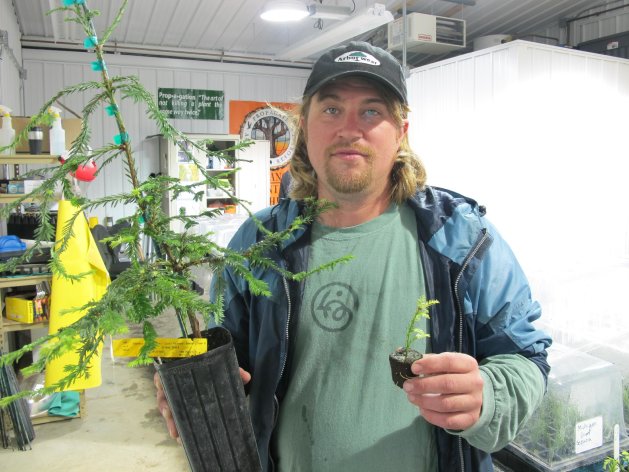
Ceremonial plantings of two dozen clones from California's mighty coastal redwoods were taking place Monday in seven nations: Australia, New Zealand, Great Britain, Ireland, Canada, Germany and the U.S.
Although measuring just 18-inches tall, the laboratory-produced trees are genetic duplicates of three giants that were cut down in northern California more than a century ago. Remarkably, shoots still emerge from the stumps, including one known as the Fieldbrook Stump near McKinleyville, which measures 35 feet in diameter. It's believed to be about 4,000 years old. The tree was about 40 stories high before it was felled.
"This is a first step toward mass production," said David Milarch,
co-founder of Archangel Ancient Tree Archive, a nonprofit group
spearheading the project. "We need to reforest the planet; it's
imperative. To do that, it just makes sense to use the largest, oldest,
most iconic trees that ever lived."
Milarch and his sons Jared and Jake, who have a family-owned nursery
in the village of Copemish, Mich., became concerned about the condition
of the world's forests in the 1990s. They began crisscrossing the U.S.
in search of "champion" trees that have lived hundreds or even thousands
of years, convinced that superior genes enabled them to outlast others
of their species. Scientific opinion varies on whether that's true, with
skeptics saying the survivors may simply have been lucky.The Archangel leaders say they're out to prove the doubters wrong. They've developed several methods of producing genetic copies from cuttings, including placing branch tips less than an inch long in baby food jars containing nutrients and hormones. The specimens are cultivated in labs until large enough to be planted.
In recent years, they have focused on towering sequoias and redwoods, considering them best suited to absorb massive volumes of carbon dioxide, the greenhouse gas primarily responsible for climate change.
"If we get enough of these trees out there, we'll make a difference," said Jared Milarch, the group's executive director.
Archangel has an inventory of several thousand clones in various
stages of growth that were taken from more than 70 redwoods and giant
sequoias. NASA engineer Steve Craft, who helped arrange for David
Milarch to address an agency gathering, said research shows that those
species hold much more carbon than other varieties.The challenge is to find places to put the trees, people to nurture them and money to continue the project, Jared Milarch said. The group is funded through donations and doesn't charge for its clones.
"A lot of trees will be planted by a lot of groups on Arbor Day, but 90 percent of them will die," David Milarch said. "It's a feel-good thing. You can't plant trees and walk away and expect them to take care of themselves."
The recipients of Archangel
redwoods have pledged to care for them properly, he said. The first
planting of about 250 took place in December on a ranch near Port
Orford, Ore. Others were being planted during Earth Day observances
Monday at the College of Marin in Kentwood, Calif., and in parks and
private estates in the other six countries.
"I know the trees will thrive here," said Tom Burke, landscape manager at the College of Marin.

No comments:
Post a Comment